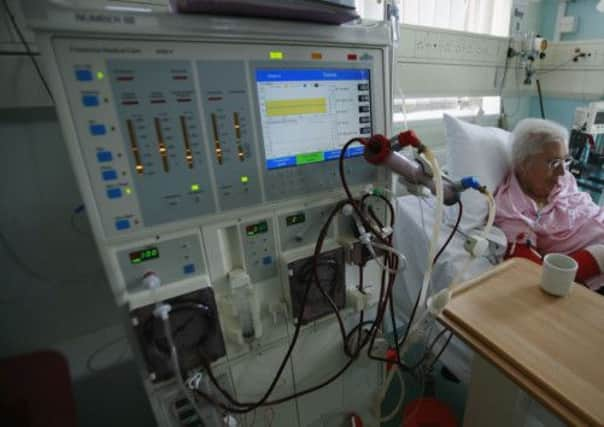£2.2m grant for Dundee Uni kidney dialysis project


The ReDVA (Development of hemodynamic solutions in Renal Dialysis Venous Access) project involves scientists and academics at the university’s Medical School, the Queen Elizabeth Hospital in Birmingham and industrial partners.
The major new funding for the study has been awarded by the European Union’s Marie Curie Partnership and Pathways programme to develop the new technology that will improve dialysis delivery.
Advertisement
Hide AdAdvertisement
Hide AdMore than 250,000 patients across Europe require kidney dialysis, and this figure is increasing at four to six per cent annually. Haemodialysis, the commonest form of treatment, sees blood taken from a vascular access site in the arm, passed through a dialysis machine and returned to the patient three times a week.
A Dundee University spokesman explained: “The problem is that these vascular access sites fail in at least half of patients within the first year, leading to increased infections, hospital stays and operations. The ReDVA consortium will examine the problems that occur during long-term haemodialysis and look to improve the performance of vascular access that underpins the life-supporting dialysis techniques.
“The academic members of the consortium will work with work with biotechnology experts at the University of Limerick in Ireland, Guerbet, a global imaging contrast company in France and Dundee-based Vascular Flow Technologies to investigate venous access and develop new clinical technologies, methodologies and devices to improve their performance.”
He added: “The four-year project will see staff seconded between the universities and the industry partners as well as creating five new research posts.”
Professor Graeme Houston, of the Medical Research Institute at Dundee, is leading the project. He said, “The problem with vascular access for dialysis is that the vessel or implanted graft narrows leading to poor and prolonged dialysis and blockage.
“As the patient needs dialysis every couple of days, a temporary access must be created but this commonly leads to infection, prolonged stay in hospital and more operations. The underlying reason the access fails is recognised to be due to increased turbulence and tissue build up in the vessel.”
He added: “New techniques in imaging the vessel with ultrasound and MRI before it blocks, combined with improved surgical technique and vascular devices offers a real prospect of improving the lives of kidney failure patients. The research group offers an unparalleled range of expertise in surgery, imaging, and engineering to tackle this problem.”
Renal Transplant Surgeon Mr Nick Inston at QEHB said: “This is the largest vascular access research project in the world tackling a major issue for patients who require dialysis.”
Advertisement
Hide AdAdvertisement
Hide AdEric Lancelot, the European Medical and Regulatory Affairs Manager at Guerbet, said, “Guerbet is committed to producing imaging contrast which is safe and effective for patients with kidney failure. We are looking forward to joining ReDVA partners in improving the lives of patients with kidney failure.”